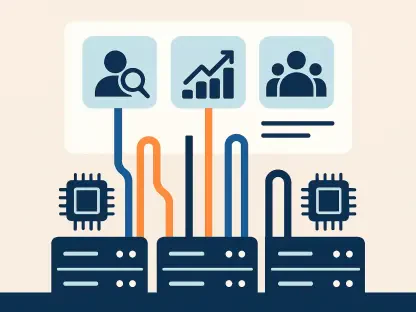In recent years, the corporate world has witnessed significant transformations in the pursuit of diversity, equity, and inclusion (DEI) within organizational frameworks. Historically, these initiatives have been at the forefront of promoting equal opportunities and fostering innovative environments. However, recently, there has been a growing trend where some major corporations appear to be revisiting and reducing their DEI commitments, highlighting the controversies and debates that have enveloped these initiatives. As political and cultural tensions surrounding DEI continue to rise, they bring to the surface critiques that argue such programs potentially shift focus away from meritocracy by accentuating identity considerations over performance. These perspectives have prompted many HR professionals to reconsider the methodologies and strategies they adopt, paving the way for a more data-driven approach that could better navigate the complex landscape of DEI. This strategic pivot is not only about defending DEI initiatives but about embedding objective and science-based decision-making processes into the very fabric of corporate structures.
The Shifting Paradigm of DEI in the Corporate World
The changing dynamics of DEI in recent times have prompted organizations to critically evaluate their initiatives, focusing on the scrutiny and political debates underscoring these changes. Traditionally, DEI programs aimed at creating equitable workplaces drew from the core principles of enhancing talent acquisition, ensuring equitable promotion opportunities, and cultivating collaborative teams. However, with the increasing political polarization, new challenges have emerged for HR professionals. They face mounting pressures from executives and observe fluctuating sentiments among employees, who may experience lowered morale due to modifications in DEI efforts. Furthermore, communication becomes crucial as HR leaders find themselves conveying and managing the resulting implications of scaled-back DEI programs to their employees. As this transformation takes place, companies must develop strategies that allow them to maintain DEI’s foundational goals while addressing both internal and external pressures.
Adding to the evolving narrative are the growing concerns that DEI initiatives may sideline merit-based systems, leading to comprehensive reviews within organizations. Initially conceived to create level playing fields and drive innovation, these programs have inadvertently become entangled in wider cultural and political debates, with some critics viewing them as potentially diluting the principles of meritocracy. This sentiment has had wide-reaching repercussions, influencing employee relations and causing some corporations to tread cautiously in their commitments to DEI. Consequently, HR departments find themselves balancing between upholding DEI’s core objectives and navigating the broader dialogues surrounding these initiatives. Amidst such challenges, maintaining organizational harmony requires careful attention, especially given the increasing critiques of DEI programs as mere identity exercises lacking substantive meritocratic underpinnings.
Embracing Data-Driven and Objective Decision-Making
Against the backdrop of these evolving challenges, HR professionals are encouraged to steer away from exclusively defending DEI initiatives under potentially polarizing labels. Instead, there is a growing advocacy for integrating science-based decision-making frameworks throughout the corporate structure, thereby fortifying the organization through practices that rely on merit-based criteria. By focusing on objective processes, companies can better shield themselves from ideological criticisms, providing a more robust foundation for achieving DEI outcomes. This approach not only promises to bolster the organization’s internal processes but can also contribute significantly to talent acquisition and retention, ensuring that diverse perspectives are valued and leveraged. Moreover, the shift towards data-driven strategies can provide HR leaders with the tools required to systematize fairness in crucial decision points, enhancing overall effectiveness.
Incorporating such evidence-based methodologies allows HR professionals to address criticisms directly, ensuring that DEI programs operate within frameworks that prioritize merit while also recognizing the diverse attributes individuals bring to the workplace. Structured hiring, for instance, involves standardized questioning and clear scoring rubrics, facilitating objective evaluations that reinforce equal opportunities and remove biases. Similarly, promotions and succession planning benefit immensely from evidence-driven processes, ensuring advancement decisions align with clearly defined competencies and measurable outcomes. These strategies not only counteract biases but also instill trust among employees, reinforcing transparency in career advancement policies. An environment that rewards merit while valuing diversity is likely to attract a broader talent pool, ultimately enhancing organizational success in a competitive market landscape.
Challenges and Risks of Scaling Back DEI
While retreating from DEI commitments may seem like an expedient solution in the face of political criticisms, there are significant risks associated with such a direction. Employees, particularly those who hold diversity and inclusivity in high regard, may feel disenfranchised by dwindling DEI initiatives, leading to increased attrition rates. Furthermore, such a retreat can diminish employee engagement, erode morale, and complicate retention efforts, potentially compromising the organization’s overall performance and reputation. HR professionals are tasked with the dual challenge of maintaining equilibrium within the workforce while defending the broader organizational values in the face of external critiques. Moreover, advocacy groups may intensify their condemnations, placing HR departments in challenging positions as they attempt to preserve internal cohesion.
Equally problematic is the trend among some organizations to attempt rebranding DEI initiatives as a strategy to navigate political or cultural backlash. The substitution of terms like “DEI” with alternatives such as “belonging” or “culture-building” often proves ineffective, as critics may interpret the change as superficial or lacking depth. Such rebranding efforts risk alienating employees who perceive the change as a retreat from corporate commitments to equity and inclusivity. This could, in turn, damage trust and HR credibility, undermining efforts to align organizational culture with DEI goals. The critique that DEI programs appear to be little more than quota systems or acts of reverse discrimination necessitates more thoughtful and strategic actions that directly address such perceptions. Building upon objective principles of fairness and merit could provide a robust counterpoint to these criticisms.
Aligning DEI with Proven Business Outcomes
Despite the challenges faced, the business case for robust DEI programs remains strong. Research by leading consultancies like McKinsey & Company consistently affirms that organizations with diverse leadership and inclusive cultures tend to outperform financially. These findings underscore the importance of retaining DEI as a crucial component of HR strategy, particularly in appealing to Millennials and Gen Z, who often value diversity highly in their employment choices. Therefore, while the narrative and labeling surrounding DEI may evolve, the goals underpinning these initiatives remain vital in driving corporate success. The emphasis on improving the quality of organizational people-decisions remains a primary responsibility for HR departments navigating the intricacies of modern workforce management.
Central to achieving these objectives is the need for fairness and bias removal throughout the employee lifecycle. Talent acquisition processes should involve structured methodologies, employing standardized questioning and scoring systems that ensure objectivity. Promotion and succession planning, when underpinned by clear competencies and measurable achievements, allow HR to effectively manage career progression within meritocratic structures. Additionally, inclusive workplace policies support environments where all employees can thrive, reinforcing organizational values despite negative connotations associated with DEI rhetoric. By aligning DEI initiatives with robust data-driven strategies and scientific decision-making principles, HR professionals can transcend ideological barriers and bolster workplace equity effectively.
Strategic Path Forward for HR Professionals
In recent years, the corporate landscape has seen profound changes as organizations strive to implement diversity, equity, and inclusion (DEI) practices. Historically, these efforts have led the charge in ensuring equal opportunities and cultivating innovative workspaces. However, a noticeable shift is occurring where some major companies are scaling back their DEI commitments, sparking debates and controversies. These changes reflect growing political and cultural tensions over DEI, with critics arguing that such initiatives may detract from merit-based systems by focusing on identity over performance. This criticism has prompted many HR professionals to rethink their strategies, increasingly turning to data-driven methods for navigating the intricate DEI environment more effectively. The strategic shift aims not only to support DEI programs but to weave objective, scientific decision-making into the core of corporate frameworks, ensuring that these practices serve as a foundation for fair and progressive workplace cultures.









